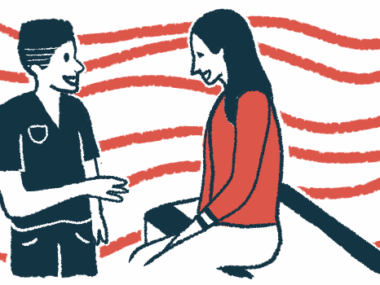The Physical and Emotional Impact of Needing Lifelong Antibody Therapy
Despite the side effects, columnist Shalana Jordan focuses on the bright side
Written by |

Note: This column was updated Jan. 17, 2025, to correct that Soliris is an antibody therapy.
Ding-ding, ding-ding.
The ringing echoes throughout the unit, causing a brief silence. It sounds like the toll of a bell as a boat leaves the harbor. Then the unit erupts in unanimous applause and cheering.
These are the sounds I hear at least once during my antibody therapy treatment every two weeks. This is the bell I’ll never have the opportunity to ring.
A lifelong commitment
In September 2020, I had a brush with death when a mild case of COVID-19 kicked my immune system into overdrive. It triggered a response so severe that my immune system began attacking my blood. After spending weeks in the intensive care unit, I was finally diagnosed with atypical hemolytic uremic syndrome (aHUS). Because I carry the rarest gene mutation of the disease, I’ll need antibody therapy forever.
Currently, the only approved treatments for aHUS are Soliris (eculizumab) and Ultomiris (ravulizumab-cwvz), which both suppress the immune system. Every 14 days, I receive an infusion of Soliris, along with one bag of IV fluids, at a local cancer center. I also do bloodwork and have my weight and blood pressure checked. I’ve been doing this every two weeks for over two years.
Last week, a new patient was seated next to me. When his wife couldn’t find the drinks, I told her where she could get juice, water, and snacks.
Her husband chuckled and said, “Thank you. You must be a veteran here.”
I replied, “Yes, two years going strong.”
My words surprised us both.
I never thought I’d say that I’m the longest-attending patient at the cancer center. All of the staff know who I am. I’ve become a regular at the facility. I update my nurses on family gossip and chat with the front desk girls about their lives.
Most patients there are being treated for cancer with chemotherapy or radiation, while others are receiving iron infusions or immunotherapies. These treatments tend to last weeks or months. And once someone has completed their treatment, they get to ring that glorious bell.
It’s hard not to get sucked into the thrill and happiness, the clapping and cheers. I’m truly happy for those who ring the bell. Cancer is serious, and not everyone survives it. But it would be nice to be able to ring the bell myself. It would be nice to be done with antibody therapy.
While “infusion” often describes a treatment that makes you feel better, many aHUS patients struggle with side effects of the therapy we need to stay alive.
For me, Soliris has caused hair loss, brain fog, muscle damage, cartilage deterioration, and even bone pain. I’m constantly fatigued and exhausted, no matter how much I sleep. And I experience other intense symptoms for 48 hours after each infusion.
The bright side
But even with all the symptoms that are now a permanent fixture in my life, I find peace in the fact that my situation could be worse. The beginning of my aHUS journey was much worse. It involved dialysis, plasmapheresis, blood transfusions, 15 medications, deconditioning, a hysterectomy, and so much more.
What helps me through life with aHUS, lupus, and subsequent medical issues is finding the bright side, no matter how frustrating things may be. Negativity can adversely affect our mental and physical health. Finding the positives in my circumstance has been critical to my recovery and life adjustments. I think this is the key to living with a rare or chronic illness.
Watching others suffer humbles me deeply. I saw a handful of people die during the first few months of my medical journey. I’ve seen patients too weak to care for themselves or even stand.
This may sound strange, but I feel fortunate that I only need antibody therapy. It’s strange to need this for the rest of my life, but it’s better than receiving many additional treatments. I may never ring the bell, but I have the rare opportunity to bask in the glory of others’ recoveries.
Note: aHUS News is strictly a news and information website about the disease. It does not provide medical advice, diagnosis, or treatment. This content is not intended to be a substitute for professional medical advice, diagnosis, or treatment. Always seek the advice of your physician or other qualified health provider with any questions you may have regarding a medical condition. Never disregard professional medical advice or delay in seeking it because of something you have read on this website. The opinions expressed in this column are not those of aHUS News or its parent company, Bionews, and are intended to spark discussion about issues pertaining to aHUS.







Leave a comment
Fill in the required fields to post. Your email address will not be published.